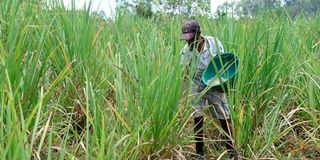Cane farmers want defunct Kenya Sugar Board reestablished, refuse zoning

A farmer topdressing Urea and DAP fertilizer on a sugarcane farm at Muliru area Ikolomani in Kakamega county on 2nd October 2022. Sugarcane farmers from Western region want the defunct Kenya Sugar Board re-established.
Sugarcane farmers from the Western region have supported the re-establishment of the defunct Kenya Sugar Board as proposed in the Sugar Bill, 2022, sponsored by Navakholo MP Emmanuel Wangwe.
The Bill that is undergoing public participation seeks to reinstate the Sugar Act, which was repealed through the enactment of the Crops Act that birthed the Agriculture Food Authority (AFA) in 2013.
Kenya Sugar Board was mandated to carry out various roles in the sugar industry and act as the proxy between the various stakeholders in the industry and the government.
The legislation seeks to restore the roles of the Kenya Sugar Board that are currently undertaken by the Sugar Directorate of the AFA.
The farmers argued that the Sugar Directorate under AFA Act, 2013 lacks the autonomy to address challenges in the sugar industry subjecting farmers and millers to exploitation by cartels that have infiltrated the industry.
Kenya Sugarcane Growers Association chairman Richard Ogendo told a Parliamentary Committee on Agriculture and Livestock that there is a need to have the Sugar Board in place and that it should comprise representatives from selected millers to bring on board issues affecting farmers from all sugar zones in the country.
Mr Ogendo said the board will help regulate, develop, and promote the industry, which has over the last years been faced with financial woes and mismanagement.
“We want the Kenya Sugar Board brought back so that it helps in streamlining policy control, direction, and regulation of the sub-sector, including control of sugar imports,” said Mr Ogendo.
The proposed law also seeks to re-introduce the sugar development levy on domestic and imported sugar to revamp the sugar industry and be used for the development and promotion of the industry.
The levy that was charged at four percent of the factory prices was scrapped in 2016.
Mr Yegon said there was no clear funding mechanism for farm inputs and crop husbandry since the removal of the levy.
The House Committee is reviewing the Sugar Bill, 2022 which aims to reinstate the Sugar Act, by meeting with sugar millers and farmers to collect their views on the proposed legislation.
Besides seeking to provide for the regulation, development, and promotion of the sugar industry in Kenya, the Bill also establishes the Kenya Sugar Board and outlines its powers and functions.
The Committee has visited Butali Sugar Mills, West Kenya Sugar, Nzoia and Mumias Sugar Companies in the Western region.
During the engagement, sugar millers presented their proposals on contentious issues such as cane poaching, delineation of sugar catchment areas, enforcement of measures to curb cane theft, and insufficient access to seed cane.
Konoin MP Brighton Yegon, who led the team in Western, said the review of the Bill and collection of the views from the millers and farmers was a step in promoting the development and regulation of the country’s sugar industry that is crucial to the country’s economy.
“The last parliament passed the Tea Act and there is agitation by the current parliament to remove some crops from AFA so that they can get proper attention. Some of the crops are sugarcane and coffee,” said Mr Yegon.
The farmers further called for the abolishment of zoning and called for farmer-miller agreements irrespective of their location within the sugarcane catchment area.
Mr Raphael Werimo, a farmer from Matungu in Kakamega said due to population growth, the sugar manufacturing sector faces a shortage of industrial land as more families have sub-divided their lands making the land-scarce for industrial farming.
“Kenya is a free market economy. Sellers and buyers have the freedom to buy and sell from anyone willing to buy or sell at the marketplace. Zoning should not be an issue for farmers, it concerns millers who are competing for the raw material,” pointed out Mr Werimo.
He said zoning had created healthy competition in the sugar sector leading to an increase in price per cane that stands above Sh5000.
Also Read: I don’t rue switching from cane to nduma
Appreciated zoning, the farmers said it was relieving them from unhealthy company practices from millers who sign contracts with them.
“For example, certain companies take long to issue cane harvesting permits to their farmers. Tonnage prices are usually low and the companies take a very long time to remit payments. But competition on cane sourcing has improved the process of cane harvesting and payments to farmers,” added Mr Werimo.
However, Kakamega Senator Boni Khalwale said there needs to be an effective regulatory framework and a good master plan to get the troubled sugar industry back on its feet.
“A good sugar master plan should protect rural livelihoods, jobs and the trade as well as create diversified revenue streams for sugar producers. In Ethiopia, the reforms in the sugar sector have helped increase the annual production capacity of sugar factories, we can borrow a leaf from Ethiopia,” said Mr Khalwale who is opposed to privatisation of sugar mills in Western region.
He said the sector has been neglected for long, putting thousands of farmers in economic jeopardy and asked the government to commit to writing off debts and tax liabilities of State mills in order to make the industry more efficient and competitive.





